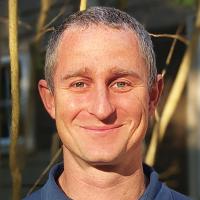This project seeks to unify macroevolutionary discoveries across the fields of genomics, developmental biology, and paleontology through characterizing a universal progression of sequential periods of gene regulatory evolution for vertebrate lineages. In particular, they will quantify the temporal accuracy of computational methods to reconstruct ancestral genomes by comparing the morphological consequences of these inferred ancestral sequences (especially regulatory elements) to known morphologies in the fossil record. A key output of this work is the ability to test hypotheses about directional genomic trends in the macroevolution of diverse lineages using genome engineering to replace extant regulatory sequences with the computed ancestral sequences in experimental model organisms.

Craig Lowe
Directionality in Genomics and Macroevolution
The genetic basis of macroevolutionary trends
Subaward Principal Investigator
Duke University
Craig's background is diverse in that he has significant training in both computational genomics and developmental genetics. His undergraduate education is in computer science, with a focus on machine learning. For his graduate degree, he worked to apply his computational skills to the analysis of some of the first vertebrate genomes. For his postdoctoral studies, he focused on developmental genetics so that he could perform experiments at the bench to test his computational predictions. In his own lab, he mixes computational genomics and experimental genetics to establish a virtuous cycle. The computational predictions define a set of promising candidates for wet-lab experiments. The wet-lab experiments then either support or disprove the computational predictions, which allows his group to then improve the computational model. This diverse background has allowed him to create an interdisciplinary environment where his lab has had students with backgrounds in mathematics, neuroscience, developmental biology, and genetics.

Christiana Fauci
Directionality in Genomics and Macroevolution
The genetic basis of macroevolutionary trends
Duke University
Christi is from Long Island, New York where she attended SUNY Stony Brook to receive her Bachelors of Science in biology with a focus on developmental genetics in 2017. During her time at Stony Brook she taught general chemistry and several genetics courses while working in the Colognato lab, managing their mouse colony. She started the University Program in Genetics and Genomics at Duke University in 2019 where she joined Craig Lowe’s lab in the Molecular Genetics and Microbiology Department. In the Lowe Lab Christi works on understanding the genetic mechanism of vertebrate evolution with a particular interest in finding when certain non-coding sequences arose and how they contributed to modern bird features. This application is particularly interesting because Christi has developed a method of examining these sequences in the Japanese Quail system.

Riley J. Mangan
Directionality in Genomics and Macroevolution
The genetic basis of macroevolutionary trends
Duke University School of Medicine
Riley is a Ph.D. Candidate in Molecular Genetics and Microbiology who specializes in evolutionary biology, comparative and population genomics, and developmental neuroscience. His research focus is in uncovering how genetic changes specific to the human lineage have influenced neurodevelopmental programs that have enabled the emergence of human-specific morphological and behavioral traits.
